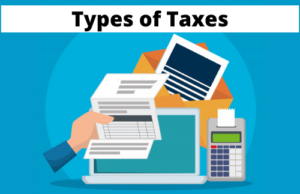A you know tax planning is important but first we have to understand the basics of it as what exactly it is. Let’s understand it with a story.
5 children were living in a village. In their village, there was no paved road. Every time they went out to play one of them often fell in a pit. So they decide one day to ask their parents to build a paved road for them. Unfortunately, parents didn’t have enough money for such a large construction. So children decided to contribute money so that funds could meet the requirement to make a road. Soon the parents agreed too.
Now the question arises, why only 5 children’s families contribute to something which will be used by everyone?
Problems like these are solved through taxes.
How do you get public facilities like paved roads, public security personnel, public health services, and public transport among others?
Where does the money come from?
It comes from the taxes paid to the government.
Everyone contributes so that everyone can benefit.
WHO PAYS TAXES?
Anyone who earns or has an income pays taxes. The individual who is liable to file taxes and fall in the payable income tax slab is an income taxpayer. A part of their earnings is deduced in the form of taxes that have to be paid to the government.
If you own a shop or a company, a part of your profit is paid as tax.
It is because you make use of public services to make your profit.
If you have your income, own a house, or buy and sell things you have to pay tax.
HOW MUCH TAX DO YOU NEED TO PAY?
According to the ability of an individual and on the level of earnings.
The government determines the threshold level of annual income from time to time. A person who is having a regular income below this level is relieved from paying taxes. In India, Citizens having taxable income above Rs. ₹ 2.5 lakhs need to pay income tax.
TYPES OF TAXES

There are different types of taxes in the US. Most of these taxes fall into basic categories such as Taxes on income, property, goods, and services.
Taxes on income
Earned income is the income you receive from your earning sources. The United States runs under a progressive tax code. This says that all things are equal. The more you earn, the higher the rate of taxation. Also, many systems allow individuals to reduce their tax bills with various credit schemes and allowances.
-
Payroll taxes
Employers of the US must subtract payroll taxes from their worker’s paychecks each period and match the deducted sum. These payments are called FICA taxes because they are authorized by the Federal Insurance Contribution Act. 7.65 % of the individual worker’s income goes to FICA taxes. 6.2 percent goes to fund the nation’s social security system, while 1.45 percent goes to Medicare.
-
Capital gain taxes
The US capital gain tax is applied to the profits made by selling assets held for more than a year known as long-term capital gains. Tax applied to the assets held for less than a year is known as a short-term capital gain. They are taxed as ordinary income only.
-
Estate taxes
It is levied on the transfer of the property upon the death of the owner to prevent the continuation of tax-free wealth within the country’s most affluent families. The tax exempts the first $5.43 million of an estate’s worth This tax affects only 1% of the citizenry of the US.
TAX ON PROPERTY
Property tax is also known as VALOREM TAX. It is imposed on the value of the real estate or the other personal property. It is imposed by the local government and charged periodically. For example, homeowners will generally pay their real estate taxes either once a year or monthly installments as part of their mortgage payments.
-
Real estate taxes
These taxes fluctuate based on jurisdiction assessment on property worth. This depends on the condition, location, and market value of the property or the changes of amounts proportionally distributed to various recipients of the tax.
For example, homeowners in a certain community could see an increase in the tax levied on their property when residents decide to increase the millage rate (amount per $1000 used to calculate taxes) for a school system.
In another example, home taxes may decrease when property values decrease in bad economic conditions.
Other assets that may be subject to a property tax are automobiles, boats, and airplanes. In some places, tax is collected on other types of business property such as factories. As long as you own the property, you continue to pay real estate taxes.
TAXES ON GOODS AND SERVICES
-
Sales tax
It is applied to purchases made on the retail level. There is no sales tax at the federal level but the states, cities, and local districts may apply their separate taxes. The tax rate varies with the types of items bought and the place. For example, a state may apply 2% tax on groceries but 4% on all other stuff.
-
Excise tax
These taxes are based upon the quantity of the item purchased and not on its particular value. For example, on every gallon of gas purchased an excise tax of 18.4 cents is applied by the federal government. This doesn’t depend on the price charged by the seller.
FILING FOR TAX RETURN
To report income, expenses, and other relevant tax information in a form filed with a tax authority. Tax returns allow taxpayers to calculate their tax accounts, schedule tax payments, or request refunds for the overpayment of taxes. In many countries, tax returns need to be filed annually.
Tax returns are generally prepared using forms prescribed by the IRS (The Internal Revenue Service) or other relevant authorities (for example, the Massachusetts Department of Revenue) in the US.
The Internal Revenue Service (IRS) is a U.S. government agency that is in charge of the collection of taxes and enforcement of tax laws.
Individuals use IRS form 1040 to file federal income taxes.
- The form determines the due dates for additional taxes or if the filer will receive a tax refund.
- Personal information, such as name, address, Social Security number, and the number of dependents is required.
Corporations will use Form 1120 to file their annual returns. Many types of 1099 forms are used to report income from non-employment-related sources (alimony, sale, etc).
SECTIONS OF THE TAX RETURN FOR TAX PLANNING
There are three major sections in the tax returns where you can report your income, and determine deductions and tax credits for which you are eligible:
Income
All sources of income are enlisted in this section. Wages, dividends, self-employment income, royalties must also be reported.
Deductions
Deductions lower the tax liability. In the United States, tax deductions are offered in federal and state taxes. Different tax codes in different regions allow taxpayers to deduct a variety of expenses from taxable income.
Tax credits
Tax credits are amounts that offset the total amount of tax debt owed by an individual, corporation, or other entity to a taxing authority like the IRS. These also vary widely among places. However, there are often credits provided for the care of dependent children and seniors, pensions, education, and many more.
The end of the process of tax return filing identifies the amount of the tax owed by a taxpayer-owned or the amount of tax overpayment. Tax overpaid is either refunded or rolled into next year.
TAX PLANNING BENEFITS FOR SENIOR CITIZENS.
Once you turn 50 and especially after the age of 65 you are authorized for extra tax breaks. There is a bigger standard deduction for senior citizens. They can earn more before filing a tax return. Workers over 50 can put off or avoid taxes using retirement and health savings accounts.
Below are some ways to save on taxes for senior citizens:
- If a couple both age 65 and older, The threshold limit for tax filing is $27,000 for them.
- If only one spouse is at least age 65, then the threshold limit for tax filing is $25,700 compared to $24,400 for younger couples.
- Property tax rules fluctuate according to state and local jurisdiction. People who are above a certain age and earn below a specific income level are qualified for property or school tax exemptions in some places.
- Couples both age 65 or older with a lower income can be eligible to claim a tax credit for seniors. Retirees who qualify may be able to lower their tax bill by taking the credit.
- Those at age 60 or older can get free tax assistance provided by The Tax Counseling for the Elderly program. IRS-certified volunteers prepare older taxpayers with the basic tax returns.
CONCLUSION
If you enjoy the facility of public services this could only be possible through your contribution. Everyone must contribute to funding public services. But also be aware of their tax liability and tax overpayment. Tax is a mandatory contribution requested by public authorities only.
Also Read:
- The Annual 3.5% Tax Which The US Currency System Imposes On India
- Budget 2023 Explained: Big Relief For Taxpayers
- What To Expect In Budget 2023? Income Tax, Common People Expectations
- How To File An Income Tax Return If You Are A Salaried Individual?
- What Happens If You Don’t File An Income Tax Return?
- The Quintessential Guide To Business Taxes
- Mastering Time Management: How To Manage Time
- Charting The IPO Journey In India: Past, Present, And Beyond
- Staying Afloat: The Art Of Cash Flow Management For Startups
- Liquid Fund Vs. FD: How To Compare The Risks And Rewards
- From Financial Crisis To Global Cooperation: The Evolution Of G20
- Indian Startups: Are They Bleeding Money?
- Financial Planning For Business Owners: Why You Need A CFO On Your Team




